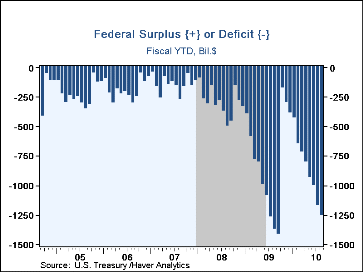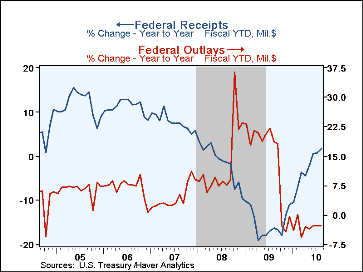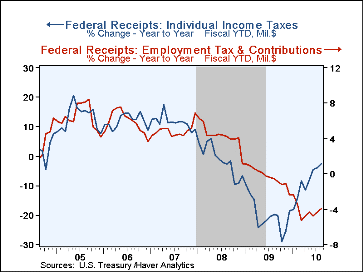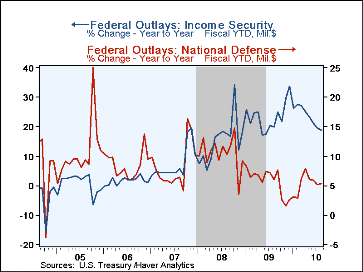 Global| Sep 13 2010
Global| Sep 13 2010U.S. Fiscal 'YTD Budget Deficit Narrows Further As Receipts Pick Up
by:Tom Moeller
|in:Economy in Brief
Summary
The Federal government ran a budget deficit last month of $90.6 billion pulling the YTD deficit to $1,169 billion. That was diminished from the deficit of $1,267 billion during the first eleven months of FY'09. The deficit's decline [...]
The Federal government ran a budget deficit last month of $90.6 billion pulling the YTD deficit to $1,169 billion. That was diminished from the deficit of $1,267 billion during the first eleven months of FY'09. The deficit's decline year-to-date is somewhat swifter than the latest projection from the Nat'l Association For Business Economists of a diminished $1,310 billion for all of 2010. Last month's deficit roughly matched Consensus expectations.
Net revenues during the first eleven months of FY'10 showed positive growth for the first time since May 2008. Individual income tax receipts fell 4.1% y/y as the unemployment rate remained elevated. However, that rate of decline compares to a peak 29.0% at the end of last year. Corporate tax receipts rose by one-third 'YTD versus the first eleven months of last fiscal year with improved corporate profits, and the gain is accelerating. Year-to-date, employment taxes fell 4.4% (just lightly lower than the peak rate of decline) but unemployment insurance tax receipts improved by 11.4% versus the first eleven months of last fiscal year. Estate & gift taxes fell by nearly one-quarter.
Overall, net outlays fell 2.8% so far this fiscal year versus FY'09. "Income security" spending (11% of outlays) continued to jump by nearly twenty percent while defense spending (19% of total outlays) rose 5.2%. Social Security payments (21% of outlays) rose 3.4% and net interest payments (5% of outlays) rose an accelerated 10.5%. Medicare expenditures (12% of outlays) rose 4.6% and other health care services spending (10% of outlays) rose 10.2%.
The Government's financial data are available in Haver's USECON database, with extensive detail available in the specialized GOVFIN.
| US Government Finance | August | FY 'YTD | FY 'YTD | FY '09 | FY '08 | FY '07 |
|---|---|---|---|---|---|---|
| Budget Balance | $-90.6B | $-1,169B | -- | $-1,417.1B | $-454.8B | $-161.5B |
| Net Revenues | $164.0B | $1,752.0B | 0.7% | -16.6% | -1.7% | 6.7% |
| Net Outlays | $219.B | $2,921.6B | -3.5% | -2.8% | 9.1% | 2.8% |
Tom Moeller
AuthorMore in Author Profile »Prior to joining Haver Analytics in 2000, Mr. Moeller worked as the Economist at Chancellor Capital Management from 1985 to 1999. There, he developed comprehensive economic forecasts and interpreted economic data for equity and fixed income portfolio managers. Also at Chancellor, Mr. Moeller worked as an equity analyst and was responsible for researching and rating companies in the economically sensitive automobile and housing industries for investment in Chancellor’s equity portfolio. Prior to joining Chancellor, Mr. Moeller was an Economist at Citibank from 1979 to 1984. He also analyzed pricing behavior in the metals industry for the Council on Wage and Price Stability in Washington, D.C. In 1999, Mr. Moeller received the award for most accurate forecast from the Forecasters' Club of New York. From 1990 to 1992 he was President of the New York Association for Business Economists. Mr. Moeller earned an M.B.A. in Finance from Fordham University, where he graduated in 1987. He holds a Bachelor of Arts in Economics from George Washington University.
More Economy in Brief
 Global| Feb 05 2026
Global| Feb 05 2026Charts of the Week: Balanced Policy, Resilient Data and AI Narratives
by:Andrew Cates










